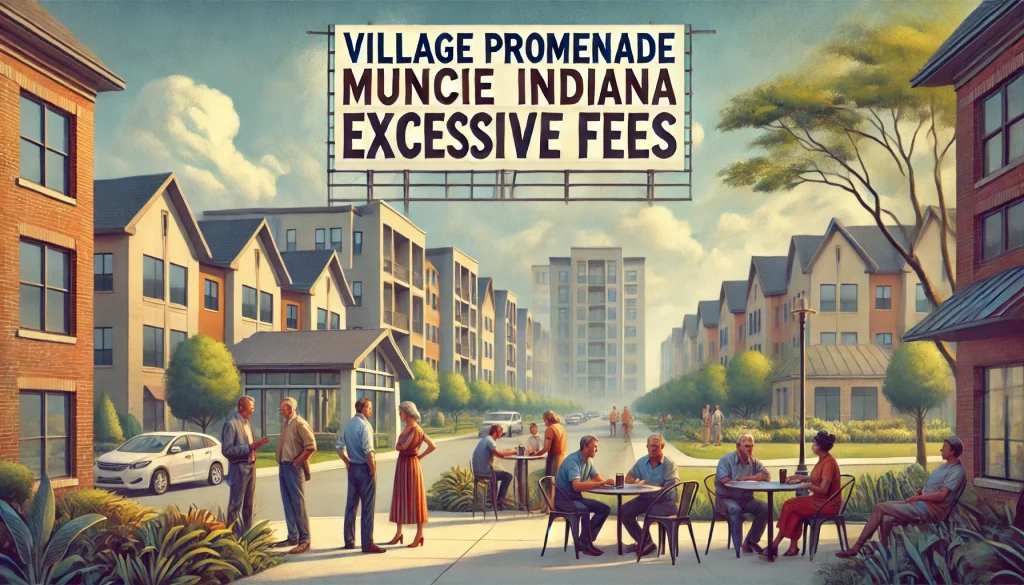The issue of village promenade muncie indiana excessive fees has become a significant concern among residents and tenants in the area. Many individuals have expressed frustration over the rising costs associated with living in this community, prompting a closer examination of the fee structures in place. Understanding the factors contributing to these excessive fees is crucial for residents seeking to advocate for fairer practices.
In recent years, the transparency of these fees has been called into question, leading to confusion and dissatisfaction among tenants. The village promenade muncie indiana excessive fees are not just financial burdens; they can affect the overall quality of life for residents. As more people become aware of their rights and the implications of these charges, there is a growing demand for clarity and accountability from property management.
Furthermore, the impact of village promenade muncie indiana excessive fees extends beyond individual residents. It influences the local housing market and community dynamics, shaping perceptions of the area. By addressing these concerns, residents can work towards a more equitable living environment that promotes community engagement and satisfaction.
Legal Implications of Excessive Fees in Rental Agreements
Excessive fees in rental agreements can have serious legal ramifications for both landlords and tenants. Many states have specific laws that govern what landlords can charge beyond standard rent, including late fees and maintenance fees. If these fees are deemed excessive, tenants may have the right to contest them in court, potentially leading to legal action against the landlord.
Tenants should familiarize themselves with local and state laws regarding rental fees. For instance, the law may stipulate a maximum allowable fee or require landlords to provide detailed explanations for any charges. Failure to comply can result in penalties for landlords, including reduced revenue from disputed fees.
In many cases, tenants can challenge these excessive charges through various legal avenues. Mediation or small claims court may provide pathways for tenants to reclaim unjust fees. Awareness of these options empowers residents and can lead to more equitable outcomes in rental agreements.
Understanding the legal framework surrounding village promenade muncie indiana excessive fees can help residents make informed decisions. Proper documentation and awareness of rights can significantly influence the outcomes of disputes related to excessive charges in rental agreements.
Challenges Residents Face with Unjust Charges
Residents in the Village Promenade often encounter significant challenges when confronted with unjust charges. One of the most pressing issues is the lack of clear communication from property management regarding fee structures. This can lead to confusion, with residents uncertain about what they are being charged for and why.
Another challenge is the emotional and financial strain excessive fees can impose on tenants. Many residents may struggle to budget effectively when unexpected fees arise. This unpredictability can lead to stress and dissatisfaction, diminishing the overall quality of life for those living in the community.
Moreover, residents may face obstacles when attempting to dispute these charges. Property management may not always be responsive to complaints, leaving tenants feeling powerless. The potential for retaliation, such as eviction or lease termination, further complicates matters for those who challenge unjust fees.
Advocating for change often requires collective action among residents. Forming tenant associations can help amplify their voices and address the systemic issues related to unjust charges, leading to better practices and transparency in property management.
Financial Impacts of Rising Fees on Local Residents
Rising fees in rental agreements can have severe financial implications for tenants, particularly those with limited incomes. As property management fees increase, many residents find themselves struggling to make ends meet. Families, in particular, may need to cut back on essential expenses, such as groceries or healthcare, to afford their housing costs.

- Impact on families:
- Reduced savings and financial flexibility
- Necessity to cut back on non-essential spending (e.g., entertainment, vacations)
Seniors, especially those living on fixed incomes, face heightened financial challenges. As fees rise, they often struggle to cover both rent and essential living expenses. This can lead to reliance on financial aid or family support, further complicating their financial independence.
Students are also heavily impacted by rising fees. The combination of tuition, living expenses, and rental fees forces many students to take on part-time jobs or increase their debt load to maintain their housing. This financial pressure can detract from their academic focus and well-being.
- Impact on students:
- Increased need for part-time employment
- Higher student debt to cover rental costs
A look at the financial impact across different demographics:
| Demographic Group | Main Financial Impact | Common Coping Strategy |
| Families | Reduced disposable income | Cutting non-essential expenses |
| Seniors | Strain on fixed income | Seeking financial assistance |
| Students | Budget pressure, increased debt | Taking on part-time work |
Overall, rising fees not only strain individual households but can also have broader implications on the local housing market. If fees become too high, potential renters may seek alternative housing, leading to higher vacancy rates and decreased property values. This creates a ripple effect that can hurt both landlords and tenants alike.
Village Promenade Muncie Indiana Excessive Fees: A Case Study
A recent case study of village promenade muncie indiana excessive fees highlights the struggles faced by residents. In this instance, numerous tenants reported unexpected fees that were not clearly outlined in their lease agreements. Charges for amenities, maintenance, and late fees were often excessive, leading to frustration among residents.
The impact of these fees on the community was significant. Many residents reported having to make difficult financial decisions due to the added costs, which affected their ability to save or invest in other areas of their lives. The financial burden created a ripple effect, leading to dissatisfaction within the community.
In response to these challenges, residents organized meetings to discuss their concerns and formulate a plan of action. They gathered evidence of the fees, such as lease agreements and billing statements, to present a unified front to property management. This collective approach empowered residents and fostered a sense of community.
The case study emphasizes the need for transparency and accountability in property management practices. By bringing attention to excessive fees, residents can advocate for clearer communication and fairer pricing, ultimately enhancing their living experience in the Village Promenade.
Strategies for Contesting High Fees in Rental Agreements
When tenants face high fees in rental agreements, the first step is to review the lease agreement closely. Understanding what is legally binding and identifying any ambiguities can provide tenants with a foundation for contesting unjust fees. Look for fees not explicitly mentioned or explained in the lease.
Documenting every interaction with property management is critical. Tenants should keep records of all communications, including requests for fee explanations, notices of increased charges, and receipts of payments. This evidence can be used in negotiations or, if necessary, in legal disputes.
A strong strategy involves comparing the fee structures of similar properties in the same area. If tenants find that their fees are disproportionately high compared to other buildings, they can present this data to property management to advocate for fee reductions.
- Tip: Organize group meetings with other tenants to raise collective concerns about high fees, as this can lead to stronger bargaining power.
If informal discussions don’t yield results, tenants can seek legal advice or contact tenant advocacy groups for support. Legal professionals can help interpret rental laws, providing advice on whether the fees violate any regulations.
Transparency and Disclosure Practices in Property Management
Transparency in fee structures is essential for fostering trust between property management and residents. In many cases, village promenade muncie indiana excessive fees arise from a lack of clear communication regarding what fees cover. Without proper disclosure, tenants can feel blindsided by unexpected charges, leading to disputes and dissatisfaction.

Property management should implement clear policies outlining all potential fees associated with rental agreements. This could include detailed breakdowns of maintenance costs, late fees, and any other charges that may arise. Providing this information upfront can help set clear expectations for residents and reduce confusion.
A comparison of transparency practices among various rental properties can reveal disparities in how fees are communicated. Here’s a simplified table comparing transparency levels:
| Property Name | Clear Fee Disclosure | Regular Updates | Tenant Feedback Mechanism |
| Village Promenade | No | Rare | Limited |
| Nearby Community A | Yes | Yes | Active |
| Nearby Community B | Yes | Yes | Active |
Improving transparency can significantly enhance the tenant experience. Residents are more likely to trust property management when they feel informed and heard. Open channels for communication regarding fees can mitigate misunderstandings and create a more positive living environment.
Through these practices, property management can build better relationships with tenants and foster a sense of community, ultimately reducing the incidence of village Promenade muncie indiana fees.
How Maintenance Costs Are Determined in Muncie Housing
Maintenance costs in Muncie housing are influenced by several factors, such as the building’s age, the type of materials used, and the frequency of repairs. Older properties usually require more regular upkeep, which increases the costs for tenants. Common areas, such as hallways, elevators, and exteriors, also need consistent maintenance, contributing to these fees.
The local market rate for services like plumbing, electrical work, and landscaping significantly affects maintenance expenses. Property managers typically hire contractors based on market pricing, which can vary throughout the year, impacting the fees passed on to tenants.
Maintenance is often broken down into routine, preventive, and emergency repairs. Routine maintenance includes tasks like cleaning common areas, while preventive measures involve checking systems like HVAC to avoid breakdowns. Emergency repairs, like fixing a burst pipe, are unexpected but can dramatically increase costs.
Here’s an example of how different types of maintenance can impact costs:
| Maintenance Type | Frequency | Cost Impact |
| Routine | Regular | Low to Moderate |
| Preventive | Seasonal | Moderate |
| Emergency | As needed | High |
Property management generally assesses these costs annually to adjust fees accordingly, ensuring they meet the building’s maintenance demands without imposing excessive charges.
Community Feedback: A Tool for Change in Fee Policies
Community feedback is an essential tool for shaping fair and transparent fee policies in rental communities. Residents often have valuable insights into how fees affect them and what changes they would like to see. Property managers who actively seek and respond to feedback can make more informed decisions regarding fee adjustments and policies.
Surveys are one of the most effective ways to gather this feedback. They allow residents to anonymously express their concerns and suggest improvements. Many surveys reveal dissatisfaction with hidden or unexplained fees, prompting property managers to reevaluate and potentially revise their fee structures.
- Common survey findings:
- Lack of transparency in fee breakdowns
- Dissatisfaction with maintenance and amenity charges
- Unpredictable fee increases
Town hall meetings and open forums are also valuable for collecting community feedback. These sessions encourage direct communication between residents and property management, fostering a collaborative environment. By addressing concerns in real-time, managers can implement changes that benefit the entire community.
Understanding Tenant Rights in Excessive Fee Situations
Tenants dealing with excessive fees have legal recourse, though many may not realize it. Most states have tenant protection laws that regulate how much landlords can charge for various fees. These laws often limit excessive charges for late fees, administrative costs, and specific maintenance.
Before contesting fees, tenants should:
- Review their lease agreements for clear fee descriptions.
- Request an itemized breakdown of charges from the landlord.
- Check local tenant laws for caps on allowable fees.
Tenants also have the right to dispute fees not listed in the lease. If the landlord refuses to provide proper documentation, tenants can file a complaint with local housing authorities or seek legal advice. Proper documentation and a clear understanding of tenant rights are critical in these disputes.
Historical Trends in Property Management Fees
Property management fees have historically followed economic trends and housing demand. In the early 2000s, fees remained stable, primarily covering routine maintenance and administration costs. However, during the 2008 financial crisis, landlords raised fees to offset economic losses, marking the start of more frequent fee increases.
In recent years, fees have continued to rise due to increased demand for rental properties, particularly in urban areas. Many property managers have itemized additional fees for services like amenities and utilities, leading to higher total costs for tenants.
- Key factors influencing fee increases:
- Economic downturns (e.g., 2008 crisis)
- Increased demand for urban rental properties
- Additional services and amenities introduced by property management
The table below outlines average fee increases over time:
| Year | Average Fee Increase | Major Causes |
| Early 2000s | 2% – 5% | Inflation, basic upkeep |
| 2008-2012 | 10% – 20% | Financial crisis recovery |
| 2015-2023 | 5% – 12% | Rising demand, added amenities |
These trends show how economic and market forces shape the fees property managers impose on tenants.
Comparing Fee Structures Across Muncie Neighborhoods
Rental fees vary widely across Muncie, depending on the neighborhood and the property type. Newer developments in the downtown area tend to have higher fees due to added amenities such as gyms, pools, and advanced security systems. In contrast, older buildings in suburban areas often charge lower base rent but have higher maintenance fees due to aging infrastructure.
- Higher-end neighborhoods: Offer more amenities, leading to higher overall fees (e.g., fitness centers, parking).
- Suburban areas: Typically charge lower rent but may have increased maintenance fees for upkeep of older buildings.
Here’s a comparison table for different Muncie neighborhoods:
| Neighborhood | Average Maintenance Fee | Common Extra Fees |
| Downtown Muncie | $150/month | Parking, amenities |
| University District | $100/month | Security, utilities |
| Residential Suburbs | $75/month | Landscaping, maintenance |
This comparison helps residents understand what they are paying for and whether they are getting fair value compared to other parts of the city.
Village Promenade Muncie Indiana Excessive Fees: Resident Testimonials
Residents at Village Promenade have voiced growing concerns over the excessive fees being charged. Many tenants feel that they are paying for services that were originally included in their rent or not clearly disclosed when they signed their lease. This has led to confusion and frustration among residents.
Several residents have noted that fees for routine maintenance tasks, such as changing light bulbs or unclogging drains, were unexpectedly charged as extra costs. Some tenants also mentioned that fees for using advertised amenities, like the pool or gym, were imposed without prior notice.
- Resident concerns:
- Hidden fees for maintenance tasks that should be covered by rent.
- Unexpected charges for using amenities that were originally part of the lease agreement.
One resident stated, “We were told the pool was part of the rent, but later, we were charged for its use during the summer.” These testimonials highlight the need for better transparency and communication from property management regarding fee structures.
The Last Word on Village Promenade Muncie Indiana Excessive Fees
Addressing the challenges related to excessive fees in rental communities, such as at Village Promenade in Muncie, Indiana, requires a multi-faceted approach. Transparent communication between property management and tenants is essential for fostering trust and ensuring that fees are fair and justified. Community feedback plays a vital role in shaping these policies, enabling residents to voice concerns and influence changes that benefit everyone.
Rising fees significantly impact residents, especially families, seniors, and students, who may find themselves struggling to manage their finances. Understanding tenant rights and providing clear information about fee structures can help mitigate conflicts and improve tenant satisfaction. Property managers must balance the need for maintenance and amenities with the financial well-being of their tenants.
Ultimately, creating a fair and transparent fee system that incorporates feedback and protects tenants’ rights can lead to a more stable and harmonious community, reducing disputes and fostering a better living environment for all residents.

